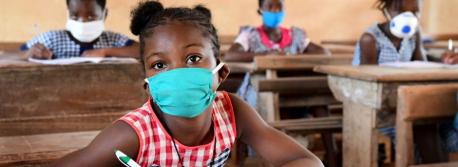
The Church of Jesus Christ of Latter-day Saints
Partner since 2013
The humanitarian efforts of The Church of Jesus Christ of Latter-day Saints relieve suffering, foster self-reliance and provide opportunities for service. The Church follows the admonition of Jesus Christ to feed the hungry, give drink to the thirsty, take in the stranger, clothe the naked and visit the sick and afflicted.
Since 2013, The Church of Jesus Christ of Latter-day Saints and UNICEF have partnered to provide health and nutrition services, emergency response, and Early Childhood Education for millions of the world’s most vulnerable children and their families, to ensure they are able to survive and thrive.
Strengthening health systems
In August 2023, the Church committed to providing $10 million to UNICEF to support health system strengthening efforts in the Central African Republic (CAR), Haiti, Mali and Mozambique.
Maternal and infant mortality rates are especially high in all four countries. By improving health infrastructure and human resources, UNICEF aims to improve health outcomes for mothers and children.
In CAR and Mozambique, UNICEF will focus its work in regions with many children have not received any immunizations, leaving them vulnerable to vaccine-preventable diseases. In Haiti and Mali, UNICEF will deliver essential support to hospitals and health districts with high neonatal mortality rates and poor health services.
Together, these programs will reach mothers, children and their communities with access to better, more resilient health care services.
“We are pleased to work together with UNICEF as we strive to create a world where every woman and child is cherished, protected and empowered,” said the Church’s Presiding Bishop Gérald Caussé.
Supporting child nutrition
In September 2022, the Church committed $5 million to support No Time to Waste, UNICEF's global initiative to address childhood malnutrition and help meet Sustainable Development Goals' targets on child wasting.
UNICEF’s No Time to Waste plan includes a package of measures seeking to better understand why and where children become wasted; increase access to services children and women need to prevent wasting; improve early detection; and scale community-based treatment, including access to Ready-to-Use Therapeutic Food.
Assisting the global COVID-19 response
In February 2021, The Church committed $20 million to support UNICEF’s global work with the Access to COVID-19 Tools (ACT) Accelerator and COVAX, leading procurement and equitable distribution of COVID-19 vaccines to 144 primarily low- and middle-income countries.
This commitment was in addition to a $3 million contribution made in 2020, which helped fund UNICEF’s immediate pandemic response providing water, sanitation and hygiene (WASH)services to areas with limited access.
With this support, UNICEF was able to scale up efforts to strengthen countries' cold chains and supply chains, train health workers, address misinformation about vaccines and build vaccine confidence.
Supporting emergency response
The Church supports UNICEF's humanitarian action for children in the wake of natural disasters, civil unrest, food insecurity and protracted crises. UNICEF has received emergency funding from the Church to provide critical programs in education, health, nutrition and WASH in the Central African Republic, the Democratic Republic of the Congo, Haiti, Jordan, Lebanon, Mozambique, Nigeria, Syria and Yemen.
Funding from the Church also supported UNICEF's emergency response in The Bahamas after Hurricane Dorian and UNICEF USA's domestic response in Houston, Texas, after Hurricane Harvey.
Supporting long-term immunization and education programs for children
Since 2014, the Church has supported UNICEF and partner efforts as part of the Global Maternal and Neonatal Tetanus (MNT) Elimination Initiative to provide vaccines to women of reproductive age, health education and birth attendants training.
By combining funding and expertise, the partnership has tackled polio and measles, helping countries develop routine immunization services and prevent and suppress disease outbreaks in Central African Republic, Chad, Ghana, Guinea, Kyrgyzstan, Madagascar and Myanmar.
In 2018, the Church provided the seed funding for Learning for Life, a multi-country program designed to meet Early Childhood Development (ECD) and education needs of refugee children. Quality ECD services provide children with nutrition, stimulation and protection for optimal brain development; a sense of stability and normalcy; and safe spaces to learn and play.
Long-term, ECD programs also help equip children and youth with the skills and life opportunities they need to break cycles of poverty and violence.
Since its inception, Learning for Life has scaled to reach refugee children in the Democratic Republic of the Congo, Kenya, Sudan and Uganda with the following impact:
some 2,000 ECD staffers received training on child-centered learning and inclusive education
40,000 parents were informed on child development and caregiving best practices
over 6,000 out-of-school children have been reached with alternative learning programs, catch-up classes that provide a pathway for returning to formal education
more than 100,000 children now have access to quality ECD programs and education